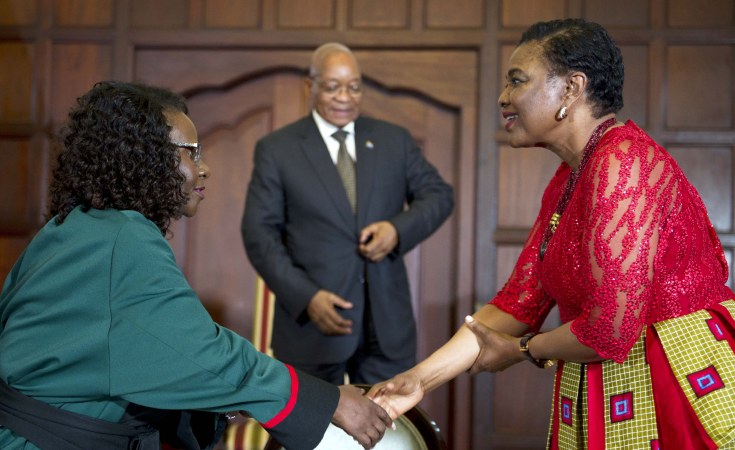By John Allen

In 2017 Justice Sisi Khampepe, left, swore in new ministers for the cabinet of President Jacob Zuma (background), including former Truth and Reconciliation Commission colleague, Hlengiwe Mkhize. In 2021 she has ordered Zuma to be jailed.
South Africa’s top court gave the country’s former president, Jacob Zuma, a verbal tongue-lashing on Tuesday for his defiance of the law and ordered him to report to police within five days to serve a 15-month prison sentence for contempt of court. There is no appeal against the order.
In a judgement delivered at the Constitutional Court in Johannesburg, Justice Sisi Khampepe, the acting deputy chief justice, accused Zuma of “outlandish” behaviour when he refused to obey a court order to appear before a commission of inquiry into high-level government and private sector corruption.
“[I]f we do not intervene immediately to send a clear message to the public that this conduct stands to be rebuked in the strongest of terms,” the judge added, “there is a real and imminent risk that a mockery will be made of this Court and the judicial process in the eyes of the public.
“The vigour with which Mr Zuma is peddling his disdain of this Court and the judicial process carries the further risk that he will inspire or incite others to similarly defy this Court, the judicial process and the rule of law.”
Responding to the court’s decision, one of Zuma’sdaughters, Dudu Zuma-Sambudla, said her father was “in high spirits and has no fear”. Referring to a government ban on gatherings under coronavirus regulations, she pledged that “Lockdown Or No Lockdown We Will Escourt (sic) You To Serve Your Time.”
The court order stipulates that if Zuma fails to report to a police station within five days, the minister and national commissioner of police must ensure that he is committed to prison within another three days.
Justice Khampepe leads the court at present because the outgoing chief justice, Justice Mogoeng Mogoeng, is on long leave pending retirement, and the deputy chief justice, Justice Raymond Zondo, is heading the commission whose subpoena Zuma has defied. Nine judges heard the case, seven of whom agreed to imprison the former president.
Khampepe, South Africa’s most senior woman judge, was born in Soweto, earned her first law degree at the University of Zululand and a master’s degree from Harvard Law School before returning to South Africa to practise labour law.
When she was appointed to the Truth and Reconciliation Commission in 1985, she came with a reputation as a feisty, no-nonsense defender of black workers and unions. After serving in the National Prosecuting Authority, she was appointed a judge in 2000 and to the Constitutional Court in 2009 – by then-President Zuma.
Delivering the judgement on Tuesday, she said the apex court was in a “precarious position… on account of a series of direct assaults, as well as calculated and insidious efforts launched by former President Jacob Gedleyihlekisa Zuma, to corrode its legitimacy and authority.
“It is disappointing, to say the least, that this Court must expend limited time and resources on defending itself against iniquitous attacks,” she added. “However, we owe our allegiance to the Constitution alone, and accordingly have no choice but to respond as firmly as circumstances warrant when we find our ability to uphold it besieged.”
After outlining why the apex court had to dispose of the case itself, instead of allowing the matter to go through lower courts, Justice Khampepe said:
“On the evidence placed before this Court, there can be no doubt that Mr Zuma is in contempt of court… the extent of the breach has not been challenged by MrZuma who, instead, has taken to multiple public platforms upon which he has affirmed the extent of his non-compliance. Those public utterances impliedly confirm not only that he is aware of the order and its contents, but also that he stridently elects to remain in defiance of it.”
She said “scurrilous and defamatory aspects” of Zuma’spublic statements justifying his defiance had informed her reasoning on an appropriate sanction for his behaviour.
“What is the appropriate sanction? For I am not in the habit of playing my cards close to my chest, let me, at this earliest opportunity, state that Mr Zuma has earned himself a punitive sanction of direct and unsuspended committal.”
She said the corruption being investigated by Zondo’scommission “is a cancer that threatens our constitutional order and the human rights to which it seeks to give meaning…” and Zuma’s “inflammatory statements intended to undermine this Court’s authority and portray himself as a victim of the law” were “scandalous”.
“It is unbecoming and irresponsible of a person in MrZuma’s position to wilfully undermine the law in this way. Mr Zuma had every right and opportunity to defend his rights, but he chose, time and time again, to publicly reject and vilify the Judiciary entirely.
“I have already detailed the lengths to which this Court has gone in this matter to safeguard Mr Zuma’s rights despite his insolence towards this Court. Consequently, there is no sound or logical basis on which Mr Zumacan claim to have been treated unfairly or victimisedby this Court. His attempts to evoke public sympathy through such allegations fly in the face of reason. They are an insult to the constitutional dispensation for which so many women and men fought and lost their lives…
“[T]he position in which Mr Zuma finds himself is of his own making and has nothing to do with the violation of any of his rights. And his attempt to equate legitimate legal processes with a witch-hunt is dangerous, unfounded and intolerable….
“Mr Zuma is no ordinary litigant. He is the former President of the Republic, who remains a public figure and continues to wield significant political influence, while acting as an example to his supporters. This leads me to the final point and exceptional feature of this matter that justifies the punitive sanction that I impose: the unique and special political position that Mr Zumaenjoys as the former President. He has a great deal of power to incite others to similarly defy court orders because his actions and any consequences, or lack thereof, are being closely observed by the public. If his conduct is met with impunity, he will do significant damage to the rule of law…
“Mr Zuma’s conduct that led to and has persisted throughout these proceedings is all the more outrageous when regard is had to the position that he once occupied. Although Mr Zuma is no longer President, his conduct flies in the face of the obligation that he bore as President. It is disturbing that he, who twice swore allegiance to the Republic, its laws and the Constitution, has sought to ignore, undermine and, in many ways, destroy the rule of law altogether.”
The leading South African anti-corruption campaign group, Corruption Watch, described the court’s judgement as “momentous” and “historically significant”. Karam Singh, head of legal and investigations at the group, said: “For the first time in South Africa, we are seeing a former head of state held directly accountable by way of a prison sentence, for his refusal to submit himself to the commission or to the jurisdiction of the ConCourt in this matter. Indirectly this speaks to his culpability in presiding over a period of state capture that has had lasting and damaging effects on the country.”
allAfrica.com
 Africa -China Review Africa -China Cooperation and Transformation
Africa -China Review Africa -China Cooperation and Transformation
